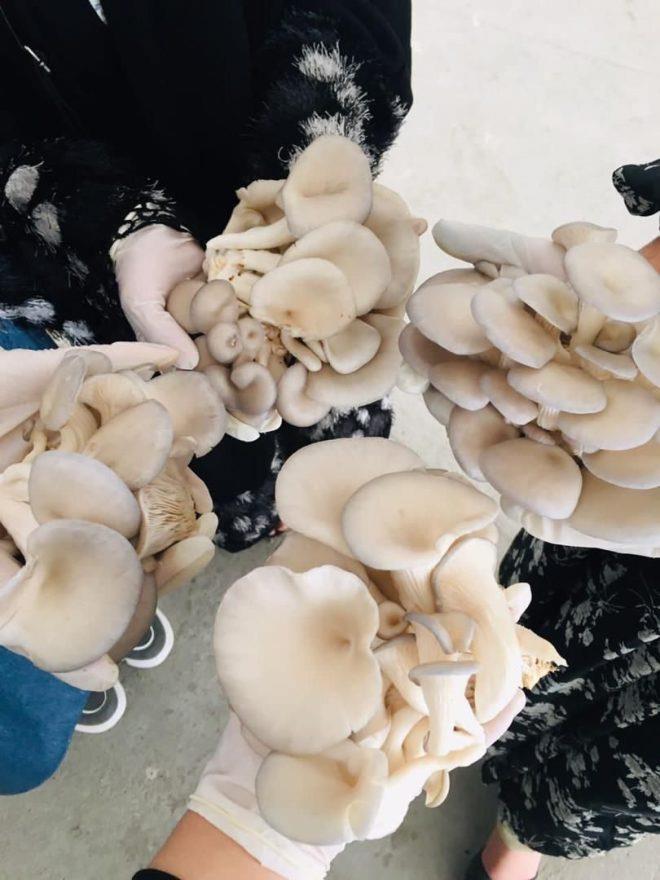
4 Afghan Girls From 4 Provinces Start Mushroom Farm To Support Local Agricultural
Four girls, studying agriculture at Kabul University, began a mushroom farming project together after facing restrictions in their studies. They hail from different provinces but shared the idea and initiative for this venture.
Zahra Bahaduri, Nazanin Rafiee, Wasima Jalili, and Yalda Qaderi, fourth-year agriculture students, jointly founded this farm after universities were closed, and now they yield from this farm throughout the four seasons.
This group of four, each from the provinces of Parwan, Nangarhar, Badakhshan, and Panjshir, initiated their work for the first time with an initial investment of 10,000 Afghanis. Their work has now flourished, and they lead this farm collectively.
Zahra Bahaduri, a member of this team, states that after establishing this farm, which was their joint decision, they endeavoured to address the psychological challenges arising from academic breaks by engaging in productive work. Furthermore, they aimed to generate income by collectively creating a farm for mushroom cultivation or“Samaruq.”
They are fourth-year students at Kabul University, majoring in Agricultural Business Management and Agriculture. However, they cannot continue their studies because the university is currently banned by the authorities for women and girls.
This team, named“Silk Road” by the four-member group themselves, aims to expand domestic mushroom production in Afghanistan to reduce reliance on imported products.
Mushroom Farm Established by the Silk Road Team Girls/Image/Sent/Khaama Press.
Zahra states,“Currently, using available materials for cultivating mushrooms, we managed to produce oyster mushrooms and obtained positive results. Now, we are awaiting the results of button mushrooms, another type of mushroom.”
According to Zahra, those currently using their produced mushrooms are friends, relatives, and neighbors, as economic difficulties hindered their ability to market more extensively.
While Zahra feels proud of establishing this farm, she acknowledges that mushroom utilization in Afghanistan is limited despite its numerous benefits. The Silk Road team wants to make the most of minimal resources but faces obstacles.
Zahra told Khaama Press,“We cannot participate in an upcoming exhibition in Kabul because the booth rental price is five thousand Afghanis, and we cannot guarantee whether we will earn this amount again in three or four days.”
Yalda Qaderi, another member of the team, highlights the diverse origins of the team members:“Zahra is from Parwan, Nazanin from Nangarhar, Wasima from Panjshir, and I'm from Badakhshan. Since we all share common knowledge in creating this venture, we were able to agree on establishing this farm.”
She believes teamwork accelerates progress significantly:“The farm's growth during this period is the result of collective effort... With teamwork, we've upgraded our farm quickly, addressing problems easily with the group's strength, which is also the reason for our stability and progress.”
Wasima Jalili, a team member, sees the mushroom farm as a result of significant changes in their lives and those of their teammates. While their work inspires other girls, the fact that they had to pause their education still troubles them.
The team is ready to facilitate learning opportunities for enthusiasts in mushroom cultivation.
Wasima Jalili says,“We four have pursued our studies in agriculture. We have the necessary knowledge of all aspects, from planting to harvesting, and we can find solutions if any problems arise.”
Each member expresses satisfaction with creating the farm, which has become a model within their families and communities. This creativity not only puts their university-acquired theories into practice but also fosters their determination for continuous growth.
Wasima remarks,“I am an example of innovation for my friends and family in such challenging conditions. They always encourage and praise me, which motivates me to continue and strive for further progress.”
The Silk Road team has achieved some financial self-sufficiency. They believe that even in such difficult circumstances, girls can become self-reliant.
Nazanin Rafiee says that after establishing the farm, she has transformed into an entrepreneurial girl, which she considers a significant change in her social and personal status:“Now, I am a confident girl who can speak with the media.”
ShareFacebook Twitter WhatsApp Email Print Telegram
Legal Disclaimer:
MENAFN provides the
information “as is” without warranty of any kind. We do not accept
any responsibility or liability for the accuracy, content, images,
videos, licenses, completeness, legality, or reliability of the information
contained in this article. If you have any complaints or copyright
issues related to this article, kindly contact the provider above.

















Comments
No comment